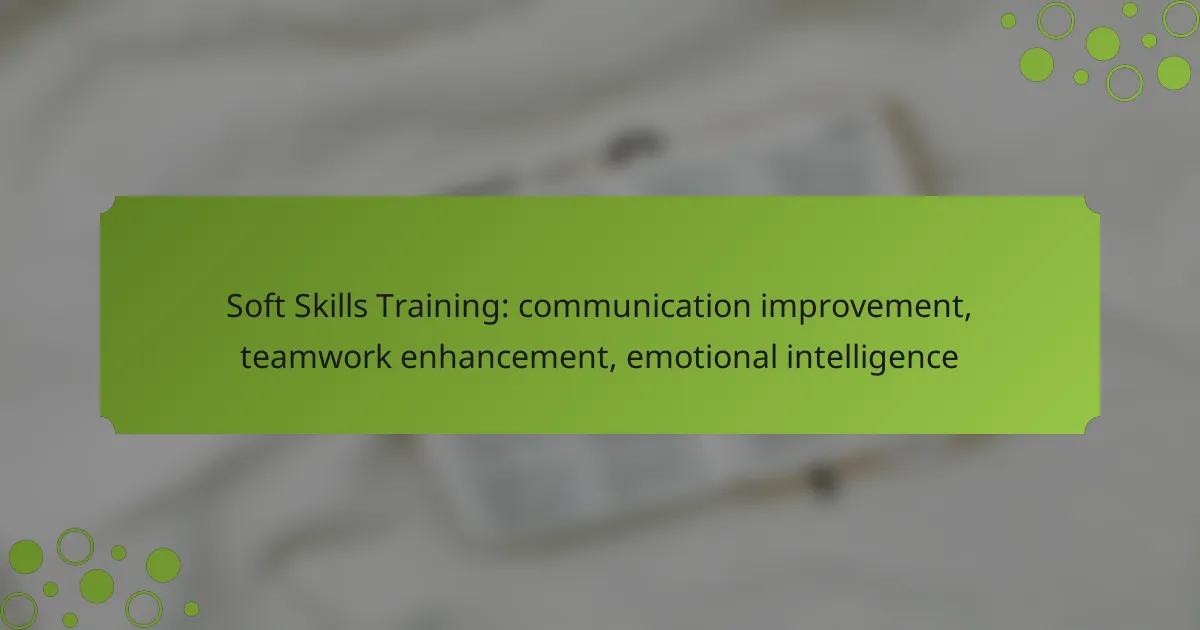
Soft skills training is essential for personal and professional growth, focusing on key areas such as communication improvement, teamwork enhancement, and emotional intelligence. By engaging in structured learning experiences, individuals can develop effective communication techniques, foster collaboration within teams, and enhance their emotional awareness. This holistic approach not only boosts individual performance but also contributes to a more harmonious and productive workplace environment.
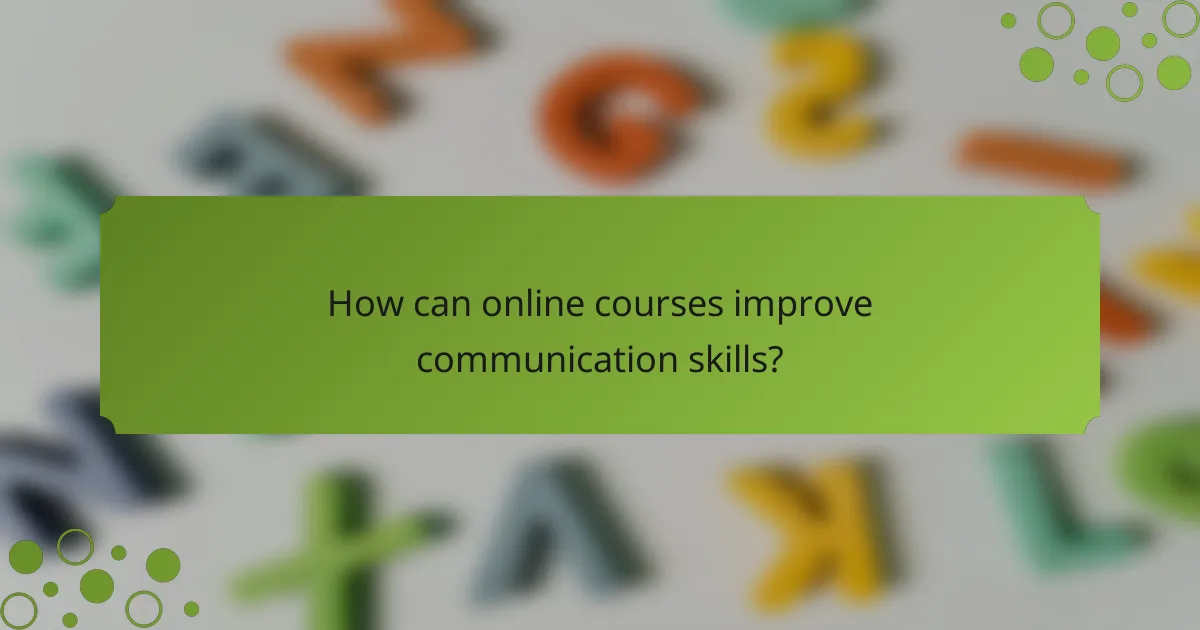
How can online courses improve communication skills?
Online courses can significantly enhance communication skills by providing structured learning environments that focus on practical application. These courses often incorporate various interactive elements that engage learners and foster effective communication techniques.
Interactive workshops
Interactive workshops in online courses allow participants to engage in real-time discussions and role-playing scenarios. This hands-on approach helps learners practice their communication skills in a supportive environment, enabling them to receive immediate guidance and support.
Workshops often include group activities that simulate workplace situations, encouraging collaboration and teamwork. This experience helps participants develop their ability to articulate thoughts clearly and listen actively.
Video tutorials
Video tutorials are a key component of online courses that can improve communication skills by providing visual and auditory learning experiences. These tutorials often cover essential topics such as body language, tone of voice, and effective messaging techniques.
By watching demonstrations and examples, learners can better understand the nuances of communication. Incorporating short quizzes after each video can reinforce learning and ensure comprehension of the material presented.
Real-time feedback sessions
Real-time feedback sessions are crucial for developing communication skills, as they allow learners to receive constructive criticism from instructors and peers. These sessions can take place during live classes or through recorded presentations where feedback is provided afterward.
Effective feedback focuses on specific aspects of communication, such as clarity, engagement, and emotional intelligence. Participants should be encouraged to ask questions and seek clarification to maximize their learning experience.
Peer-to-peer exercises
Peer-to-peer exercises facilitate collaboration and practice among learners, enhancing their communication skills through shared experiences. These exercises often involve pairs or small groups working together to solve problems or complete tasks that require effective communication.
Engaging in peer feedback helps participants identify strengths and areas for improvement in their communication styles. Setting clear objectives for these exercises can ensure that all participants benefit from the interaction and learn from one another.
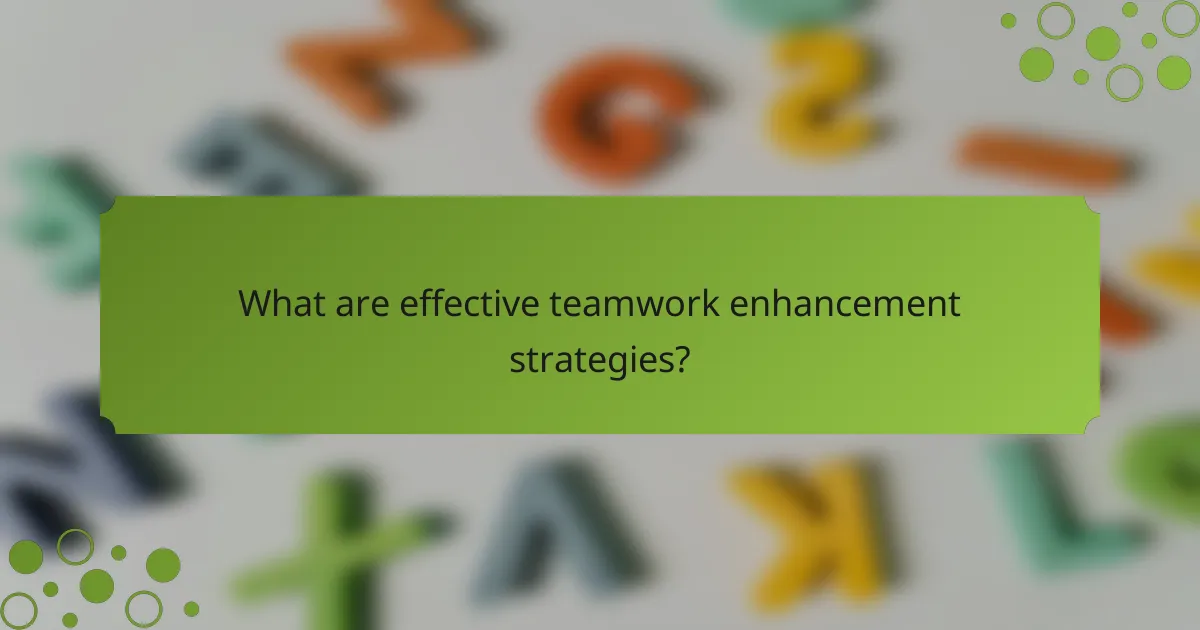
What are effective teamwork enhancement strategies?
Effective teamwork enhancement strategies focus on improving collaboration, communication, and overall team dynamics. By implementing structured approaches, teams can achieve better outcomes and foster a more cohesive working environment.
Collaborative project management tools
Collaborative project management tools facilitate communication and task tracking among team members. Tools like Trello, Asana, or Monday.com allow teams to assign tasks, set deadlines, and monitor progress in real-time, which enhances accountability and transparency.
When selecting a tool, consider factors such as user-friendliness, integration capabilities with existing systems, and pricing. Many platforms offer free trials, making it easy to test their effectiveness before committing financially.
Team-building exercises
Team-building exercises are activities designed to strengthen relationships and improve collaboration among team members. These can range from simple icebreakers to more complex problem-solving tasks that require teamwork to succeed.
Effective exercises should be tailored to the team’s dynamics and goals. For instance, outdoor activities can foster trust and communication, while virtual games can engage remote teams. Aim for a mix of fun and challenge to keep participants motivated and involved.
Virtual team challenges
Virtual team challenges are designed to enhance teamwork in remote settings. These challenges can include online escape rooms, trivia contests, or collaborative projects that require input from all team members.
To maximize engagement, ensure that challenges are inclusive and accessible to all participants. Consider time zones and varying skill levels when planning these activities. Regularly rotating challenges can keep the team engaged and help develop a strong virtual camaraderie.

How does emotional intelligence training benefit professionals?
Emotional intelligence training enhances professionals’ ability to understand and manage their emotions, leading to improved interactions and decision-making in the workplace. By developing skills in self-awareness, empathy, and emotional regulation, individuals can foster a more productive and harmonious work environment.
Improved conflict resolution
Emotional intelligence training equips professionals with the skills to navigate conflicts effectively. By recognizing their own emotional triggers and understanding others’ perspectives, individuals can approach disagreements with a calm and constructive mindset.
For instance, during a dispute, a person trained in emotional intelligence might use active listening techniques to validate the other party’s feelings, which can lead to a more amicable resolution. This approach often results in quicker and more satisfactory outcomes for all involved.
Enhanced leadership skills
Leaders with high emotional intelligence are better at inspiring and motivating their teams. They can read the emotional climate of their workplace and adjust their communication style accordingly, fostering a sense of trust and collaboration.
Effective leaders often demonstrate empathy, which helps them connect with team members on a personal level. This connection can lead to increased employee engagement and loyalty, ultimately benefiting the organization’s overall performance.
Better workplace relationships
Emotional intelligence training promotes stronger interpersonal relationships among colleagues. By improving self-awareness and empathy, professionals can communicate more effectively and build rapport with their peers.
For example, understanding non-verbal cues and emotional signals can help individuals respond appropriately in various situations, leading to a more cohesive team dynamic. Regular practice of emotional intelligence skills can significantly enhance workplace morale and collaboration.
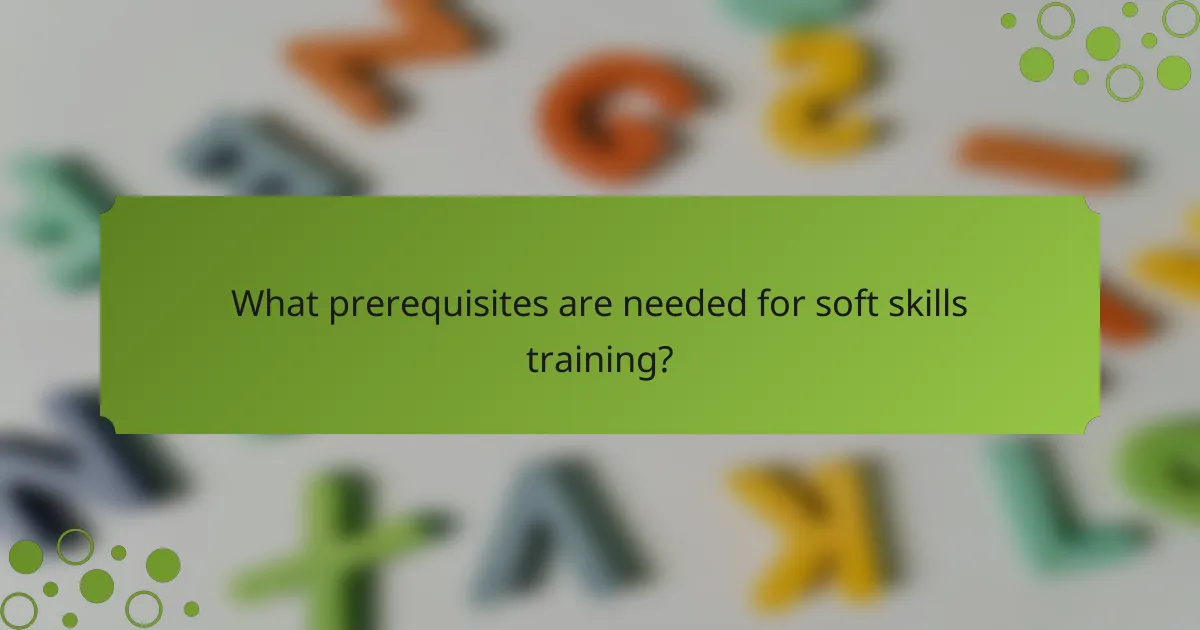
What prerequisites are needed for soft skills training?
Soft skills training typically requires a foundation of basic communication abilities and a willingness to engage actively in the learning process. These prerequisites help ensure that participants can effectively absorb and apply the skills being taught.
Basic communication skills
Basic communication skills are essential for effective participation in soft skills training. This includes the ability to articulate thoughts clearly, listen actively, and provide constructive feedback. Participants should be comfortable with both verbal and non-verbal communication methods.
To enhance basic communication skills, individuals can practice through role-playing exercises or group discussions. Engaging in activities that require clear expression, such as presentations or storytelling, can also be beneficial. Regular practice can lead to noticeable improvements in confidence and clarity.
Willingness to participate
A strong willingness to participate is crucial for maximizing the benefits of soft skills training. This means being open to new ideas, eager to learn from others, and ready to engage in discussions and activities. A positive attitude can significantly enhance the learning experience.
To foster a willingness to participate, individuals should set personal goals for what they want to achieve from the training. They should also be prepared to step outside their comfort zones, as this can lead to greater personal and professional growth. Avoiding negative self-talk and embracing a mindset of curiosity can further encourage active involvement.

Which platforms offer soft skills training courses?
Several platforms provide soft skills training courses, focusing on areas like communication, teamwork, and emotional intelligence. These platforms cater to various learning styles and budgets, making it easier to find suitable options for personal and professional development.
Coursera
Coursera partners with universities and organizations to offer a wide range of soft skills training courses. Users can enroll in individual courses or pursue specializations that bundle multiple related classes together. Most courses are designed to be completed in a few weeks, allowing for flexible learning.
Popular courses include “Improving Communication Skills” and “Teamwork Skills: Communicating Effectively in Groups.” Many courses offer certificates upon completion, which can enhance your resume.
LinkedIn Learning
LinkedIn Learning provides a vast library of video courses focused on soft skills, including communication and emotional intelligence. Subscribers can access thousands of courses, with new content added regularly. The platform also offers personalized recommendations based on your career interests.
Courses like “Developing Your Emotional Intelligence” and “Communicating with Confidence” are well-received. A subscription model allows for unlimited access, making it a cost-effective option for ongoing learning.
Udemy
Udemy features a diverse selection of soft skills training courses created by independent instructors. Users can purchase courses individually, often at discounted prices during sales. This model allows for a wide variety of topics, catering to different learning needs and preferences.
Popular offerings include “The Complete Communication Skills Masterclass” and “Emotional Intelligence at Work.” Course ratings and reviews help users choose the best options, and many courses come with lifetime access, allowing for self-paced learning.
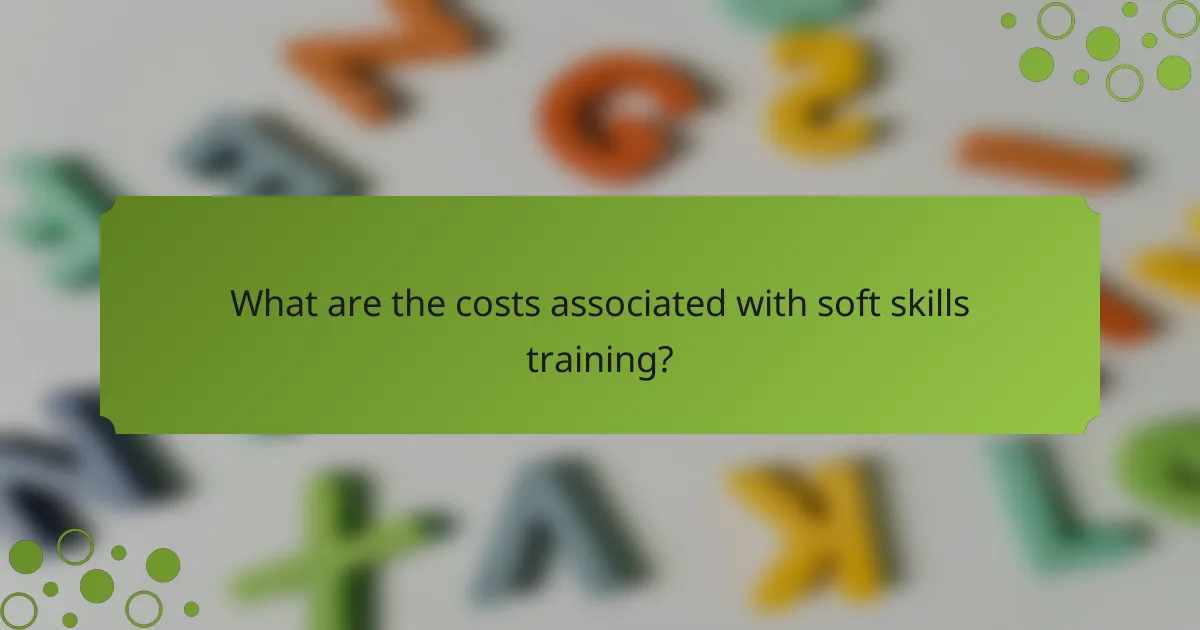
What are the costs associated with soft skills training?
The costs of soft skills training can vary significantly based on the format, provider, and duration of the program. Generally, organizations can expect to invest in both direct costs, such as training fees, and indirect costs, including time away from work.
Direct costs of soft skills training
Direct costs typically include fees for workshops, seminars, or online courses. These can range from a few hundred to several thousand dollars per participant, depending on the provider’s reputation and the depth of the training. For instance, a one-day workshop might cost around $300, while a comprehensive multi-day program could exceed $2,000.
Additionally, companies may need to invest in materials, such as workbooks or online resources, which can add another $50 to $200 per participant. It’s essential to compare different training options to find the best value for your organization.
Indirect costs of soft skills training
Indirect costs often arise from the time employees spend away from their regular duties. This can lead to lost productivity, especially if the training occurs during working hours. Organizations should consider the potential impact on workflow and plan accordingly, possibly scheduling training during less busy periods.
Moreover, there may be costs associated with follow-up sessions or ongoing coaching to reinforce the skills learned. These additional sessions can range from $100 to $500 each, depending on the format and frequency.
Return on investment for soft skills training
Investing in soft skills training can yield significant returns, including improved communication, enhanced teamwork, and increased employee engagement. Organizations that prioritize these skills often see better collaboration and higher productivity levels.
To assess the return on investment, consider measuring improvements in team performance, employee satisfaction, and retention rates. Tracking these metrics before and after training can help justify the costs and highlight the value of the investment.


